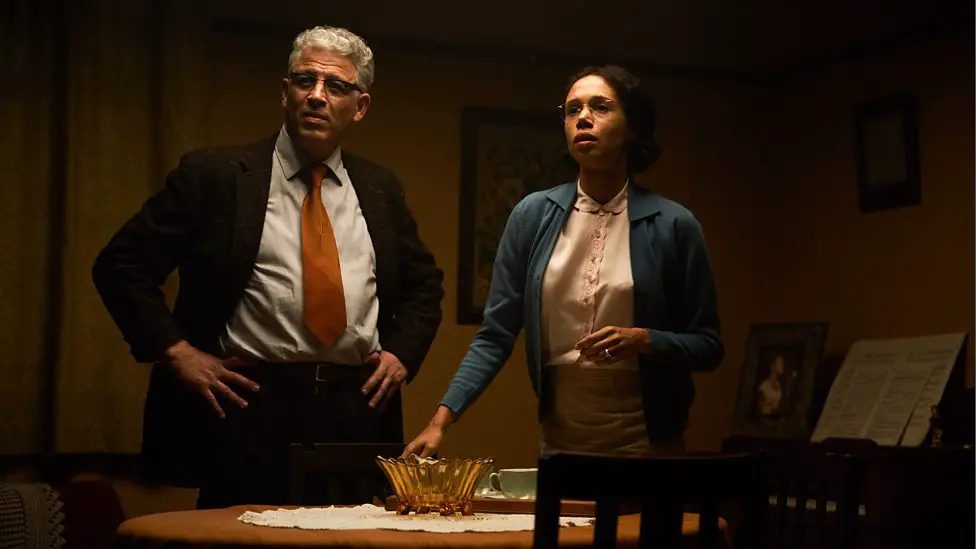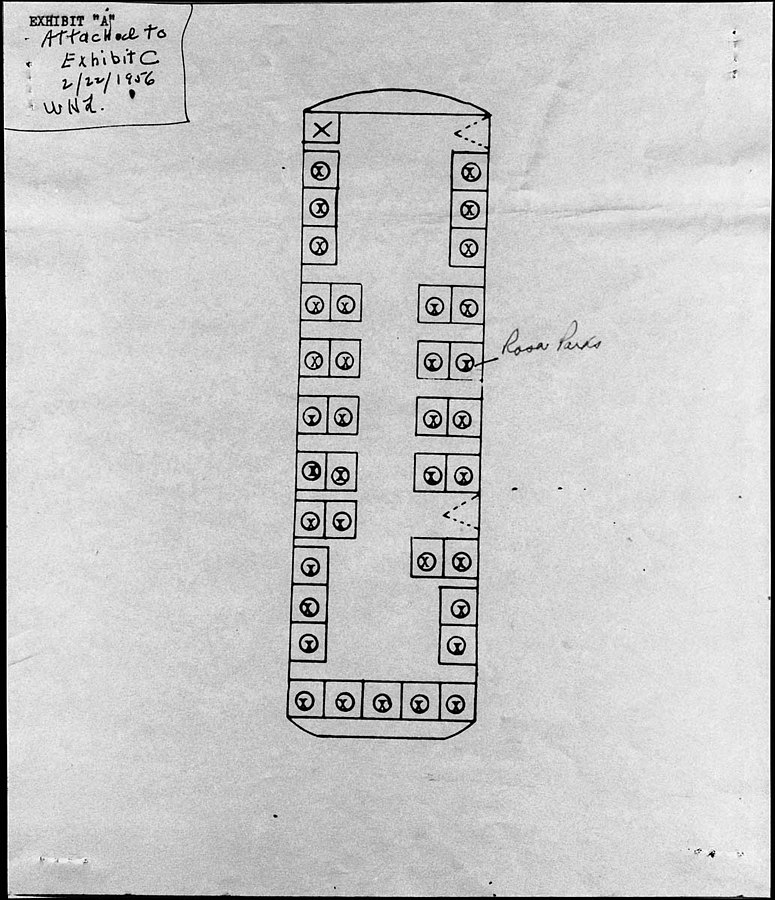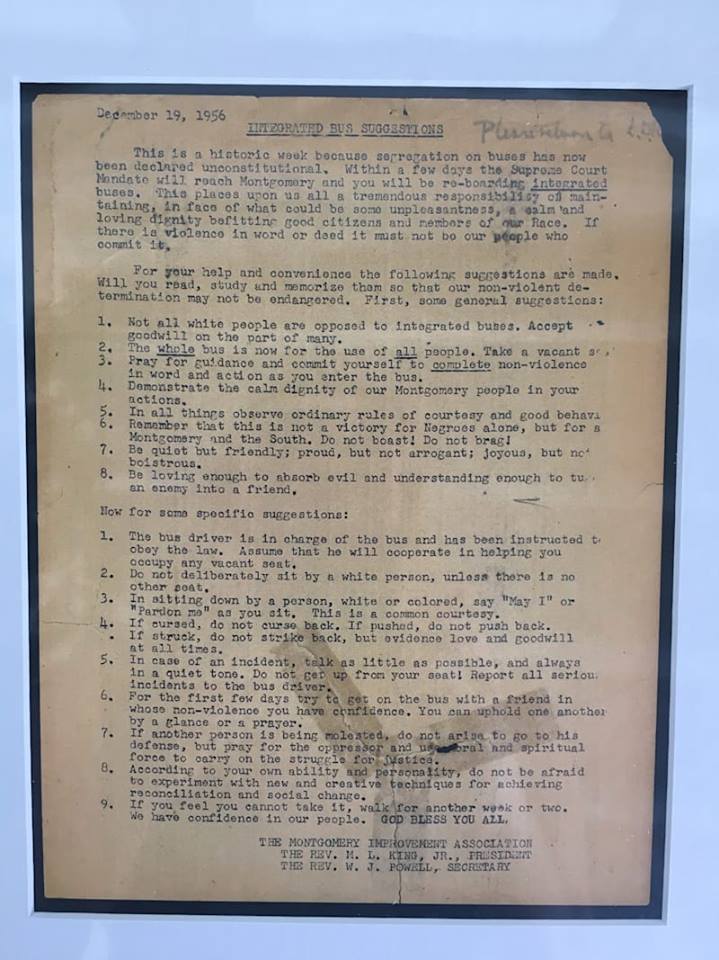; Date: Mon Jan 21 2019
Tags: Doctor Who »»»» Season 11 »»»»
Doctor Who's original remit included visiting historical events to educate children about history. We should look at Doctor Who Season 11 through that lens, and rather than call Rosa a foray into unwanted political correct nonsense, it is a historical story compatible with the original mission. If we look at the real history of the Montgomery Bus Boycott we learn that Doctor Who got some things wrong.

On October 21, 2018, Rosa was aired as part of Jodi Whittaker's first season (Season 11) as The Doctor. The TARDIS landed in in Montgomery Alabama on the day before Rosa Parks' arrest that sparked the Montgomery Bus Boycotts, which was a critical step in the Civil Rights movement. The Doctor had been aiming to return the crew to Sheffield England, but the TARDIS had other plans. As soon as they arrived, some alien time travel technology was detected in the area, and The Doctor knew something was afoot.
We were shown the TARDIS crew meeting Rosa Parks semi-randomly on the street. They wangle the opportunity for Ryan Sinclair (the black kid) to go to the Parks home, where there is a Coffee meeting that was attended by Rev. Martin Luther King. That's one line of the story.
Another line of the story shows them researching bus routes, Rosa Parks' history and movements, all intended to ensure she is on the bus and has the opportunity to refuse to change seats. This was critical in ensuring events stayed as they were, that Rosa Parks be arrested that evening, even though this racist time traveler was insistent on erasing that event from history.
The culmination came when the TARDIS crew had to stay on the bus in order to maintain enough occupied seats that forced the situation where Rosa Parks was requested to move, and then arrested when she was not.
There are elements to this which are correct, but there are many things glossed over by the story.
Rosa Parks was an activist for many years
In Rosa we saw Rosa Parks meeting with Martin Luther King, but nothing was explained other than they had a regular meeting at the Parks home.
On the
Wikipedia we learn that Rosa Parks began her activism career in the mid-40's. Her husband was a member of the NAACP, and Rosa Parks also joined the local chapter and quickly was elected Secretary of the chapter.
It is said that in her capacity as Secretary, she investigated the gang-rape of Recy Taylor, a black woman from Abbeville, Alabama. That led to Rosa Parks helping launch "The Committee for Equal Justice for Mrs. Recy Taylor".
In 1955 she completed a course in "Race Relations" at the Highlander Folk School in Tennessee, where nonviolent civil disobedience had been discussed as a tactic. This according to another
Wikipedia page. Parks was sponsored to attend this school by her employers, a liberal white couple, and the school is described as "an education center for activism in workers' rights and racial equality in Monteagle, Tennessee."
On November 27, 1955, four days before Rosa Parks' arrest, she attended a public meeting discussing the Emmett Till case. While the Doctor Who episode mentioned this case, they did not mention the meeting she'd attended. In that case a black teenager from the north was visiting relatives in Mississippi, was accused of flirting with a white girl, then got brutally murdered by a mob. The murderers got off were acquitted at trial, and the November 27 meeting was all about the case. Rosa Parks was left angered and saddened.
This only touches the surface of Rosa Parks' work, but demonstrates a long-time involvement with civil rights activism as well as training and preparation to take on the role.
Rosa Parks and Rev. Martin Luther King
The episode, Rosa, implies that Rosa Parks and Martin Luther King had been holding coffee meetings for a long time. This isn't discussed. However the Wikipedia pages do not mention the two knowing each other until after her arrest.
Immediately following Rosa Parks' arrest, the Montgomery Improvement Association was formed. The leadership was Martin Luther King Jr., E.D. Nixon, Rosa Parks, and Fred Gray. E.D. Nixon was the President of the local NAACP chapter, while Martin Luther King was paster of a local church and a prominent civil rights leader who was inspired by Mahatma Ghandi.
Arrest of Claudette Colvin
This event was not mentioned at all in Rosa, but was a key to building the case against segregation of bus operations in Alabama. On March 2, 1955, Colvin was arrested and brutally beaten in Montgomery Alabama when she refused to give up her bus seat to a white man.
According to the Wikipedia page, this case featured prominently in the legal action which ended up in the Supreme Court. Colvin was an active member of the NAACP Youth Council, of which Rosa Parks was an advisor.
Rosa Parks and James Blake
The two had a long history. In Rosa we're shown a scene from 1945 in which Rosa Parks attempted to board the bus, paid her fare, and rather than exit the bus and re-enter through the back door she simply walked down the aisle. The driver, James Blake, forced her off the bus so she could follow the rules, but then instead drove off.
This did happen, and Rosa Parks swore to never ride a bus driven by James Blake.
But on the day of her arrest, in 1955, fate had it she would be on his bus again.
Montgomery Alabama bus segregation policies

In Rosa they accurately portrayed the issue with seating on the the buses. Blacks had to sit (or stand) in the back, whites in the front, and there was a gray area in the middle. If the white section were to fill up, those in the gray section were told to move to the rear.
Baton Rouge Bus Boycott
The Montgomery Bus Boycott was not the only such action. Two years earlier, activists in Baton Rouge also staged a Bus Boycott. That Boycott resulted in Ordinance 222, which "abolished race-based reserved seating requirements and allowed the admission of African-Americans in the front sections of city buses if there were no white passengers present, but still required African-Americans to enter from the rear, rather than the front of the buses."
The Montgomery Bus Boycott was not a stand-alone event, but part of a broader movement.
Martin Luther King instructions on winning the Bus Boycott
By December 1956, one year after Rosa Parks arrest, a Supreme Court Ruling was achieved that struck down segregation in Alabama's bus systems. Dr. Martin Luther King wrote these instructions to activists showing them the non-violent approach to establishing their right to ride the bus as common practice in Montgomery.












